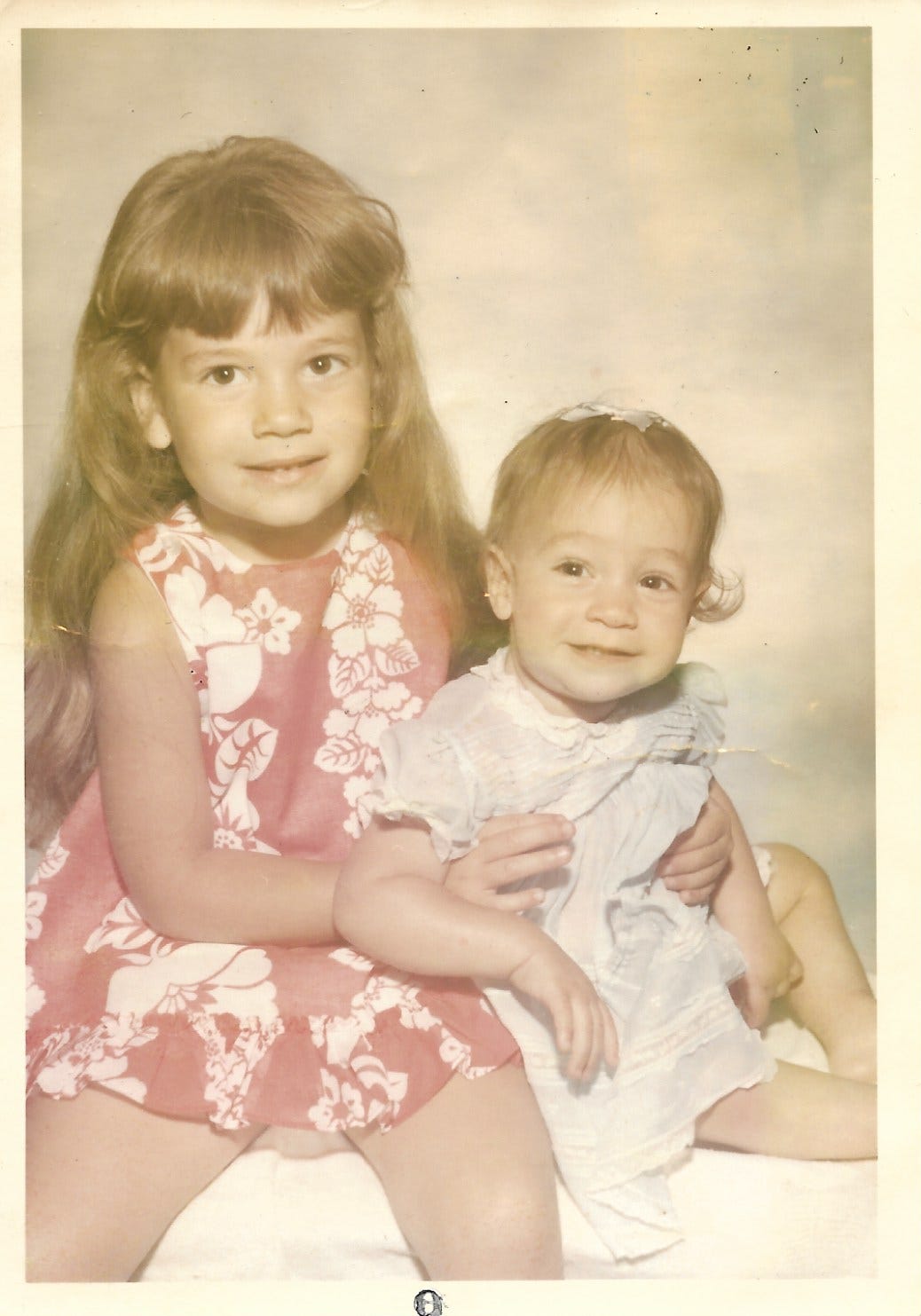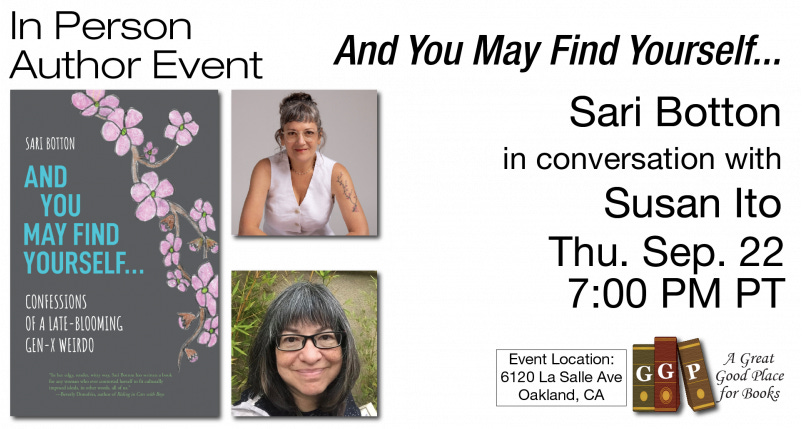The Weight: A Manifesto
An open thread on the societal pressure to be thin at any cost. Plus: details on my upcoming book events in the Bay Area.
Readers,
I can’t stop thinking about “My Mother Wanted Me to Be Happy,” Gina Fattore’s stellar personal essay published earlier this week, which begins, “My mother’s fondest wish for me when I was growing up was that I would one day be thin enough to land a man.”
Many of you “liked” the piece and commented on it, and others applauded it on social media. I think the story resonated with so many because it points to a common source of frustration: the irrational but wildly popular notion that we’re supposed to shrink our bodies to meet ridiculous thinness standards. Whoever set those standards didn’t get the message that there are many different human body types; not everyone is meant to be thin!
Gina and I first connected after she read my memoir, And You May Find Yourself. As we were preparing her essay for publication, she noted that she knew I’d *get* certain details because of what she’d read in my book. I have a chapter called “The Weight: A Manifesto” about body dysmorphia and eating disorders—not just mine, but our entire culture’s.
In that chapter I write about the first time I hated my appearance because I thought I was “fat”—when I was only 5, and my mother showed me the photo up above. At such a young age I’d already absorbed the messages surrounding us about the imperative to be super skinny. That’s how insidious diet culture is. I know I’m not alone.
I write:
How old were you when you learned to hate your body? I was 15 when I launched an all-out assault on every ounce of fat on my small frame, but I was in kindergarten the first time I thought I was bigger than I should be. My body size and shape were within a standard, normal range, according to my doctors, and photographs bear this out. But I somehow was convinced I was fat. I vividly recall the day I determined this. My mother brought me to visit my aunt at her home, farther out on Long Island. There, with me on her lap, my mom showed both of us proofs of professional photos she’d had taken of me, and I got upset when I saw them. I was wearing a red cotton summer outfit, a matching top and bottom set, with a white floral pattern on it. My cheeks and arms seemed too full to me, too soft. I didn’t want my mom to show the pictures to anyone else, and begged her not to. I look at those photos now and I can’t at all see what I saw then; I’m just a normal girl with no extra padding on her. I say this about so many other photos taken of me in the past; at the time the photos are taken, I believe I’m “fat.” When I return to them even the following year, I can no longer see it.
Here’s the open thread part:
I want to hear from you about the first time diet culture led you to believe you had to fight your own body, starving and over-exercising it into a different shape and size. And if you’ve been fortunate enough to conquer that poisonous thinking, what helped you get there? Also, do you have that same experience looking at photos in hindsight—later realizing that at the time the photo was taken, you’d had a complete misconception of your body? Tell me…
-Sari
On another note…
🚨Do you live in or near the Bay Area in California? I’m going to be doing two book events out there next week. If you’re in the area, come say hi!
On Thursday, 9/22 at 7pm, I’ll be in conversation with author and Writer’s Grotto member Susan Ito at A Great Good Place For Books in Oakland.
On Friday, 9/23 at 5:30pm I’ll be reading at Flashlight Books in Walnut Creek.





I'm an early riser and as someone who has written on this topic, feel almost obligated to comment. First of all, for people who are trying to leave this mindset behind, I encourage you to seek out critiques of fat phobia and diet culture. Maintenance Phase and Burnt Toast have been helpful to me, but there are many, many more people writing about this issue. I had already given up dieting when I found these sources, but the more we understand the actual science about weight and bodies, and the more we think about this in the context of a societal bigotry -- well, it's like a support group. It also helps to think about how the "ideal" female form is an ever changing target and one that becomes harder to attain as women gain power in society. Finally, I encourage everyone to embrace the idea that loving ourselves as we are now, in this very moment, is a radical, defiant, subversive act, a bracing "fuck you" to the voices in and out of our head. Much like Dorothy in Oz, you've always had the power to get what you want, all you have to do ('all you have to do," it's actually so hard) is to ask yourself, "What if I decide to love myself as I am, right now, in this moment? What happens next?" And I'm not saying there won't be backsliding. You'll have to take it day by day. Chances are, if you're a lifetime dieter (as I was) you and your body have to reconcile. Your body is like a partner you have spent years ignoring. It's been telling you what it wants, what it needs, and you've been chastising it for not being something else. Can you imagine being the partner in such a relationship, how dispiriting and soul-crushing it is? But the best thing is, you can start right now, right this minute. Seriously.
Last week blew my ideas about my body out of the water. I am 60 years old, weigh 180 lbs., wear a size 16+, and have been “overweight” by at least 40-50 lbs. for as long as I can remember. I’ve accepted, tolerated, and even loved this body of mine. Life is good, and that allows me to indulge more than is necessary.
Fifty years ago, my father was the first to tell me I needed to lose weight in order to be attractive and that was when rebellion kicked in. I was damned if anyone was going to shame me for my size.
During the Covid years of 2020 and 2021, I skipped my annual physical exams, so last week was the first time I’ve been to see my doctor in a while. She informed me I now have full-blown diabetes. A healthy A1C should be less than 5.7% mine is 10.4. A healthy blood glucose reading is under 140 mg/dl; mine is over 300 This is serious business. Diabetes can wreck my body if I do not manage it properly.
I want to continue being kind to myself, understanding and loving, but I know I also need to take better care of me. I have been playing the game that says “Don’t let society dictate how you see yourself; life is short - - enjoy every moment!”
Here’s the thing – it’s good to appreciate ourselves, but we have an obligation to take care of ourselves as well. Modern medicine can only go so far in resolving our health issues, and Americans are self-righteous about our needs. How dare an overwhelmed medical system that hasn’t caught up with modern demands tell me that I am not perfect!
The rate of obesity and diabetes and related conditions in our country has been rising for years and we are the only ones who can manage this for ourselves. Being shamed is not acceptable, but neither is being unhealthy when we have so much control over it. No one is going to “fix” my diabetic diagnosis but me! We need to each take charge of our health in more proactive ways. It should be welcome news that we have the knowledge and tools to manage something this important.
Now, I'm off to learn how to manage the diabetes.